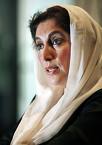28 December 2007
Courage

It is hard to stay focused on the disasters of other years when we have one in progress this very morning. I raise my coffee to the memory of a brave, or foolish, politician. I have a pile of stuff about the past that I want to sift through with you, some interesting notes on abominations of other times that reach down to ours.
Can't do it today. We will have to get back to Kaliningrad tomorrow. I am thinking about the nature of bravery, and what people are willing to do for what they think is right.
Benizir Bhutto was the lynchpin of Washington's strategy to democratize the problematic state of Pakistan, and the word came to me via cell phone as I looked at one of the proposed new windows for Big Pink.
I did not like the massive new black insert, modern and efficient as it was, and I told Fred that. It had a vaguely Stalinist tinge to it, confining, unlike the airy thin glass that originally specified by Frances Freed for her bold architectural statement.
I liked even less the idea that Ms Bhutto was assassinated in the garrison city of Rawalpindi. It was nasty and brutal. I called my son about it from the garage on the way to the car, and caught him on the first tee on a golf course in California. He said he was not surprised, and that he was glad he was not working the South Asia desk today. I said it reeked of conspiracy.
He said that was to be expected, though it was probably simpler than that. Of course, he said, there could be complicity somewhere in the Paki security machine. It is not as if killing heads of state is uncommon there. Ms Bhutto's father was hanged; Zia al-Haq was murdered in office; the Bad Guys have tried to kill plucky Pervez Musharraf five times.
I said that if I had survived an assassination attempt on the first hour after I flew into some country, I would simply have turned around and gone back to the VIP room at the airport. She knew that this was liable to turn out badly, and yet on she went.
Ms Bhutto had been on a campaign trip, playing a gallant part in the Administration's long-range South Asia strategy to democratize the military government of our strongest ally in the war on terror. With her dead, the strategy is in limbo.
Musharraf is further weakened, his popular mandate gone the way of the Supreme Court he dismissed and the martial law he imposed.
I know he has few good choices, and the Bad Guys know it, too. We Americans have fewer choices today than we did yesterday. Murder has strengthened the hands of the radicals, again, as it did in Iraq. It took resolve and blood to turn the situation around there, as it has, at least temporarily.
We are still arguing about it, in our Congress on the stump with our Candidates, just as if what began more than a decade ago can be stopped by picking up our toys and coming home.
President Musharraf has nuclear weapons, or at least his army does. Living in the present, anxious about the future, is how we live now.
That is one of the reasons it is so much easier to write about old wounds that are mostly healed, and old secrets that can be revealed. I recall living with the sense that something dangerous had to be dealt with.
Back in the day, it was the Russians and their bombs. That was something we could confront head-on.
This isn't. We are going to have to think hard about what comes next, and not flinch.
We should take a moment this morning to remember a woman with courage, who tried to make a difference, and paid the ultimate price for it.
The key to the puzzle is how to avoid all of us going the same way. There is no way to turn around, and go back to the airport.
Copyright 2007 Vic Socotra
www.vicsocotra.com
Close Window